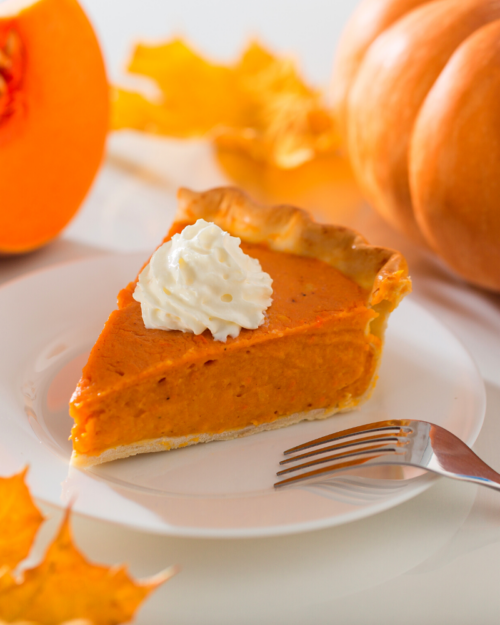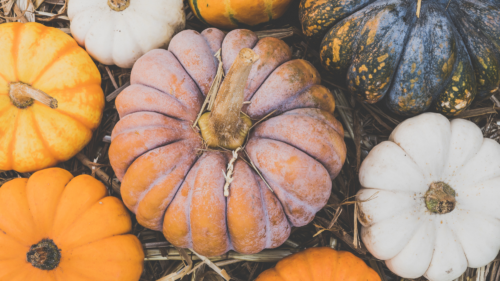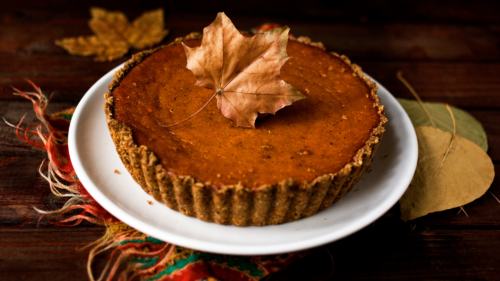I have an Aussie friend who always questions the American love for pumpkin, especially as a dessert item. Apparently, pumpkin is VERY much thought of as a vegetable in Australia and not much more. It’s an interesting premise I’d never really considered before. So I thought we’d explore it together. How exactly did this giant gourd become considered a decadent autumn dessert?

Pumpkins are believed to have originated in Central America some 7,500 years ago, but looked and tasted nothing like the fruit we know today. (Yes, they are in fact a fruit!) Early pumpkins were small and hard with a very bitter flavor. In fact, pre-Columbian natives grew them for their flesh, rather than for nutrition, though they eventually became one of the first crops grown for human consumption in North America.

The first American pumpkin recipes were published in the early 1670s in John Josselyn’s “New England Rarities Discovered” as a side dish similar to mashed sweet potatoes. English writer Hannah Woolley featured recipes resembling pumpkin pie in her 1670’s “Gentlewoman’s Companion”, describing a pie filled with alternating layers of pumpkin and apple, spiced rosemary, sweet marjoram and thyme. But at the time, crust was not quite as popular, as many early New England recipes involved filling a hollowed-out pumpkin with spiced, sweetened milk before cooking it in a fire. By the early 18th century, women were challenging themselves to create unique and innovative new ways to serve pumpkin dishes, and pumpkin pie found its way to holiday dinner tables.

The Health Benefits of Pumpkin
Considering our modern idea of pumpkins and their use in decadent pastries and caffeinated drinks, you might be surprised to learn that, on their own, they’re actually quite the superfood! Here are just a few of the amazing nutrients found in pumpkins that we often overlook:
Beta Carotene: Eye Health, Skin Health, Organ Health & SO Much More!

Pumpkins, much like other orange produce such as carrots and sweet potatoes, are high in the antioxidant beta carotene, which our bodies convert into Vitamin A. In fact, just one cup of pumpkin will provide you 200% of your recommended daily intake of Vitamin A, which is known to enhance eye-sight, improve clarity and help us see better in low-light conditions. It also helps to fight germs, promote reproductive health and keep your organs functioning optimally. Additionally, natural Vitamin A is linked with a lowered risk of certain cancers, such as lung and prostate cancer, and is much more effective than supplements. As well, beta carotene is known to reduce inflammation, which keeps your skin and body happy and healthy.
Potassium: Bone Health, Blood Pressure Regulation & Lower Risk of Disease

Did you know that the rich orange color of pumpkins is a sign of its high potassium level? Potassium is a crucial part of lowering blood pressure, as well as lowering your risk of stroke, kidney stones, and type 2 diabetes. It may also play a role in increasing bone density, which improves your overall bone health.
BONUS: If you enjoy unsalted pumpkin seeds, you’ll be delighted to know that they’re packed with minerals and plant sterols that raise HDL levels (the good cholesterol) to further fight hypertension.
Tryptophan: Sleep Health & Mood Boost

The seeds of pumpkins also contain tryptophan, the amino acid that’s notorious for producing serotonin, which calms your body, boosts your mood and promotes good sleep.
Fiber: Heart Health, Digestive Health & Weight Control

Pumpkins are high in fiber and low in calories, making it a great choice to keep you full without overdoing your recommended caloric intake. Of course, a healthy dose of fiber promotes digestive health, but did you know it also improves heart health? This combined with pumpkin’s Vitamin A and potassium content makes it a powerhouse of heart-healthy nutrients.
Vitamin C, Vitamin E, Iron & Folate: Immune Support

With a wealth of other nutrients such as Vitamins C, E, iron and folate, pumpkin can equip your cells with everything it needs to boost your immune system and promote the speedy healing of wounds.
Want some great ways to enjoy the health benefits of pumpkin?
Check out some of our amazing pumpkin recipes for yourself!
- Roasted Pumpkin Recipe
- Roasted Pumpkin Seed Recipe
- Pan-Fried Pumpkin Gnocchi with Brown Butter & Sage Recipe
- Pumpkin Mashed Potatoes Recipe
- Sweet Pumpkin Fried Wonton Desserts
- Leftover Turkey in Pumpkin Chili
The post Pumpkins: The History & Health Benefits of this Autumn Superfood appeared first on Steamy Kitchen Recipes Giveaways.
from Steamy Kitchen Recipes Giveaways https://ift.tt/nqzkTQc
via New Kitchen Special
No comments:
Post a Comment